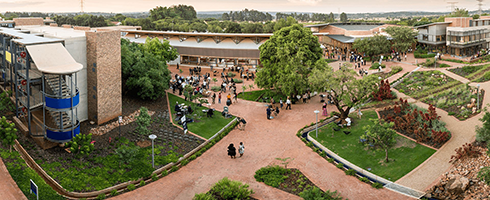About Future Africa
Future Africa is the University of Pretoria’s collaborative platform for research that works across the sciences and with society to address Africa’s biggest and most urgent contemporary challenges. Our fundamental purpose is to develop and unleash the transformative potential of African sciences to inform and inspire a future of thriving African societies.
Future Africa is a neutral platform that convenes and supports collaboration with a focus on:
Transformative research approaches – We advocate research that contributes concrete solutions to complex, real-world problems and that informs and supports processes of profound social change towards global sustainability.
We define transformative research as collaborative research that is:
- Integrative: we enable meaningful interdisciplinarity, drawing on knowledge, methods, and approaches across scientific fields and disciplines, and across the fundamental to applied research divide
- Engaged: we advance transdisciplinarity, working with stakeholders from policy, the private sector, civil society, and the media as partners in the co-design and co-production of solutions-oriented knowledge
- Holistic: we look at problems from a systems perspective, making sense of their complexity by focusing on the wider, interactive systems of which they are a part
- Digitally enabled: we harness cutting-edge tools of the digital revolution to fuel scientific discovery and to reach the widest possible number of stakeholders.
- Futures literate: we encourage the development and use of futures literacy in anticipating and shaping alternative future narratives and strategies.
The future of Africa in a global context – We work at a pan-African level to address the most critical, interconnected social, economic, and environmental problems facing African societies and, in doing so, we aim to influence and accelerate sustainability transformations across the world.
The role of early and mid-career researchers as agents of change in both science and society – We invest in the development of the next generation of global research leaders, fostering their full and meaningful engagement in how we think and what we do at Future Africa.
Future Africa provides a gateway to Africa’s rich and diverse scientific community, building equitable global partnerships, and projecting the voice of African sciences on the global stage.
Link to: Transformative Research
Objective 1
To lead transformative research in, and for Africa.
Link to: Transformative research leadership capacity development
Objective 2
To develop Africa’s transformative research leadership capabilities.
Link to: Global Networks and Partnerships
Objective 3
To build transformative global partnerships for African research.
Link to: Dialogue and Action for Change
Objective 4












